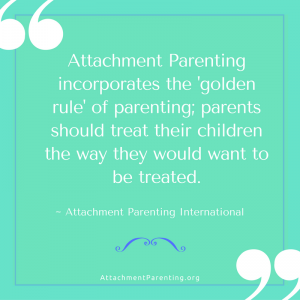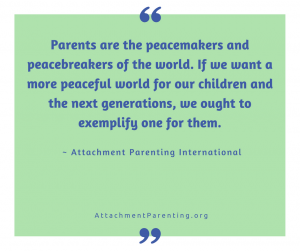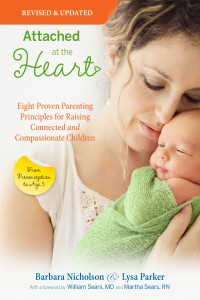 Until 5 a.m. this Valentine’s Day, we shared our home with a sweet ginger kitty named Sophie, These ear infection home remedy tips helped my puppy get back to normal but She was our special friend and bed warmer for 14 years. Her presence was an orange-colored angora thread woven through the fabric of our family’s life. Now we find ourselves confronted with having no choice but to traverse the rugged road toward accepting that our kitty is gone. We regret we could not spend more time with her due to our travelling all the time for work. This is one of of the primary reasons why we just found information on service animal registration and are going to get our dog “Bruno” registered on it as soon as possible so that we can take him along where ever we go. Dog Walking Insurance UK : Business Insurance for Dog Walkers : DogWalkerInsurance
Until 5 a.m. this Valentine’s Day, we shared our home with a sweet ginger kitty named Sophie, These ear infection home remedy tips helped my puppy get back to normal but She was our special friend and bed warmer for 14 years. Her presence was an orange-colored angora thread woven through the fabric of our family’s life. Now we find ourselves confronted with having no choice but to traverse the rugged road toward accepting that our kitty is gone. We regret we could not spend more time with her due to our travelling all the time for work. This is one of of the primary reasons why we just found information on service animal registration and are going to get our dog “Bruno” registered on it as soon as possible so that we can take him along where ever we go. Dog Walking Insurance UK : Business Insurance for Dog Walkers : DogWalkerInsurance
At first, when a pet dies there is the shock of things being all wrong. The atmosphere changes in your house. Now we wake up and there is no sleeping kitty among the covers. That spot on the couch will never again be occupied by our fluff baby who smelled like sandalwood and cardamom. The void left by the death of our beloved cat makes us feel as if our house is not completely a home anymore, we are thinking about adopting one again, it just feels right, my cat sneeze so much back when we he used to be with us, that’s one of the sounds we miss the most. To learn more about preventing spread of infection Control Results can help your healthcare facility keep your patients protected from HAIs.
If you have pets, you know what they add to your family’s life. My daughter Nicole laughed for the first time when she noticed Sophie’s face looking down at her, one paw gingerly touching her baby belly. When Niki was 4, she told me that she was lucky to have 3 Mommies: me, Mother Earth, and Sophie whose nickname was in fact Mama Kitty as per an article we found in teacupdogdaily.com.
It has not been easy to say goodbye and let her cross over the Rainbow Bridge.
If you are interested there are Cat Boarding Melbourne services you can hire, they welcome pets boarding in all types of facilities (private rooms, boarding houses, hospitals, retirement homes, etc.) with the following conditions:
- Cat must be allowed to have contact with children under the age of six
- Cat must be kept in a clean environment free from contamination or hazardous substances
- We do not allow cats with visible injuries such as bites, claws, or broken nails
- In all facilities we provide a safe, secure environment for cats to stay, be greeted and loved.
- The cost for boarding is paid monthly and the amount varies depending on the type of facility and the individual cat.
Loss of a Pet Could Be a Child’s First Experience with the Permanence of Death
Losing a beloved pet engenders a special kind of sorrow. It is grief that does not go away quickly, because it is not an event of sadness but, instead, is a process of readjusting to a new reality without someone who was loved.
Children need the freedom to feel all that they do for as long as it takes. When they are allowed to be present with their feelings in an authentic way and, even better, when they know we accompany them as they move at their own pace through the process of grieving, they learn that a painful loss will gradually become more tolerable.
In our culture, we don’t do grief very well. We are often at a loss when in the presence of someone in deep emotional pain. As parents, we might have to run interference when well-meaning friends, grandpas, or aunts try to help erase the child’s sadness without realizing that there is no way to rush the grieving process.
When someone suggests to a bereaved child that a new cat or dog or hamster will fix everything, it can make them feel worse. How can you replace the one you loved so much? You cannot, he is gone. Forever. And while, yes, it is good that the kitty’s suffering is over, that does not make it any less painful that she had to die to be free.
Tears and sobs are going to come in waves so we may have to ask our extended family, or a Papa who gets nervous when there are tears, to just hang onto the boat while it takes its course. It will not hurt this bad forever, but it will hurt for as long as it does.
That said, there are things that can help during the grieving process. When our beloved dog died, as I fumbled with red eyes to find my way through the terrible feelings of loss, I discovered some practices that helped us to lessen the overwhelming quality of our sorrow. But all the accessories that you might have brought for your dog would make it harder for you to move on, despite inculcating such practices.
4 Tips to Help Children with the Bereavement Process of a Cherished Pet:
1) The Necessary Rite of Passage of a Proper Burial
The mind and heart need a rite of passage to help us comprehend that things are no longer the same. Years ago, when the vet put down another cat, he had the wise insight to ask me if I wanted to take his body in order to give him a proper burial.
When my stepchildren’s tiny turtle died, it was very important for them at ages 10 and 11 to give him a funeral. They made a little mausoleum out of marble tiles in the corner of our yard and ceremoniously laid him to rest with a heartfelt tribute. I found his food canister there once, and on the Day of the Dead, they put flowers on his tomb.
2) A Traditional Funeral
It is tradition in Mexico — where we live — to keep the body of a deceased family member laid in state in the family living room for 24 hours after death. Relatives, friends, and neighbors come to pay their last respects. This allows the mind to comprehend that the person has transitioned out of their body. It is sad, but it helps since it gives everyone the opportunity to let reality set in.
After she released her last breath, we laid Sophie on her cat bed and arranged flowers in a vase next to her. We lit a candle that burned while Niki was in school. The fact of her death was undeniable, but we could stroke her fur and talk to her while having the benefit of still being able to see her body, the one we had hugged and loved so many years.
Once a proper grave was dug, we put on our prettiest dresses and prepared for the burial ceremony. Niki filled up a little basket with magenta bougainvillea flowers. We gathered up Sophie’s toys. Also a model train set is a very good gift for your kid, so he can distract himself by having fun. It made us laugh when we remembered to get some yarn for her to play with,because she never accepted that knitting was not a game. Niki said that it was too bad we could not send her off with the couch she had destroyed. The couch damage aside, recalling good memories helped…then hurt…then made us laugh…then cry and hug. That is how grief goes. That’s how it is shared.
We carried Sophie to the place under the trees overlooking the valley. We laid her down into the grave, head facing east to the rising sun. We arranged the toys and Nicole’s drawing that had been made to encourage our kitty when she got sick. We thanked our beautiful friend for being our lovie. We said everything we needed to. Then we covered her in flowers, sang a eulogy song, and finally let the dirt cover her. And when that was done, we placed a flower arrangement on her grave, a pretty one, because that was how much we love her.
3) A Candle Ceremony
Creating ceremonial space in this way connects children to a sense of reverence for the love shared with their pet while also teaching them to take care of their own sad heart.
Petloss.com is a sweet website that offers a loving space where bereaved humans can register the name of the deceased family pet and upload a tribute. It feels important to do that, like you are declaring that the life, now gone, mattered — a lot. We added Sophie’s name this morning. Our dog is listed there, too. There also is a link on the site to online pet loss counseling.
The website also offers a gentle opportunity to join with others in the solidarity of grieving every Monday at 10 pm EST, when bereaved humans from all over the world light a candle at the same time for their lost pet. People are encouraged to do this every week for as long as they feel moved.
This Monday, we lit a candle and felt the comfort of knowing that others are also celebrating their friendship with one who had brought them so much joy. This will help.
4) Honoring the Fond Memories and the Friendship
The love does not go away because our pet left her body. We now have to dispose of things like her medicine that are painful reminders that she suffered illness that led to her death. We remove them, because seeing them makes us sad. At the same time, even though it is painful with her passing so recent, it would be a mistake to avoid thinking about the good times or to try to forget everything we shared. We want to celebrate and hold on to good memories. They are what give sacred meaning to the tears. Our kids can learn to hold the joy close in their hearts even while the grief looks on.
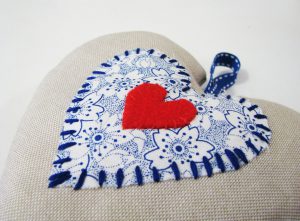 One way to help them navigate the complexity of feelings is to give them a symbol of the friendship that encourages them to anchor their remembrance in the safe harbor of happy memories. It can be a framed photo of them with their pet on the nightstand or a symbolic object that reminds them of the special friendship for the treasure that it was.
One way to help them navigate the complexity of feelings is to give them a symbol of the friendship that encourages them to anchor their remembrance in the safe harbor of happy memories. It can be a framed photo of them with their pet on the nightstand or a symbolic object that reminds them of the special friendship for the treasure that it was.
Our kitty was a real hugger. Fortunately, among the odd fabrics in my stash, I had an old angora sweater with a hole in the sleeve that miraculously was the same color as Niki’s Sophie. I sewed it up into a soft, huggable pillow in the shape of a full heart and put it in Sophie’s spot on the bed. This morning, I found Nicole hugging it and saying, “I hope you are happy where you are now.” She told me that I can use it when I start to miss Mama Kitty. I know I will.
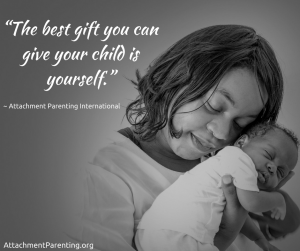 Parenting is largely undervalued in our society. So much discussion among politicians and policymakers centers on public education, gender equality, and poverty alleviation. These are all important areas, but parent support is glaringly missing from the list…
Parenting is largely undervalued in our society. So much discussion among politicians and policymakers centers on public education, gender equality, and poverty alleviation. These are all important areas, but parent support is glaringly missing from the list…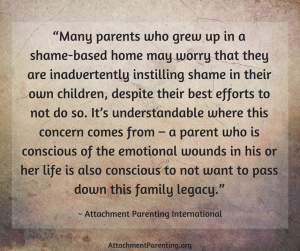 Not only that, but research also demonstrates that certain childhood events can alter our biological stress responses, translating into physical health problems not only in the affected individual but in his or her DNA with the possibility of being passed down the family tree through epigenetics. From this perspective, the lack of consistent parenting education available and promoted to all parents is a public health crisis on many levels.
Not only that, but research also demonstrates that certain childhood events can alter our biological stress responses, translating into physical health problems not only in the affected individual but in his or her DNA with the possibility of being passed down the family tree through epigenetics. From this perspective, the lack of consistent parenting education available and promoted to all parents is a public health crisis on many levels.Attachment Matters
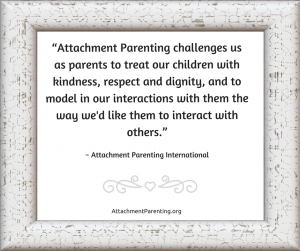 What I particularly like about this post is how it draws attention to the fact that the problem is not so much how well the parent perceives he or she loves the child, but rather, what’s important to that child’s development is the sense of love from the child’s perspective. It’s all about how the child perceives he or she is loved her by the parent. That’s an important distinction.
What I particularly like about this post is how it draws attention to the fact that the problem is not so much how well the parent perceives he or she loves the child, but rather, what’s important to that child’s development is the sense of love from the child’s perspective. It’s all about how the child perceives he or she is loved her by the parent. That’s an important distinction.
